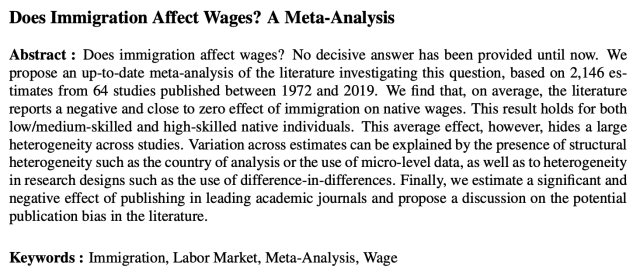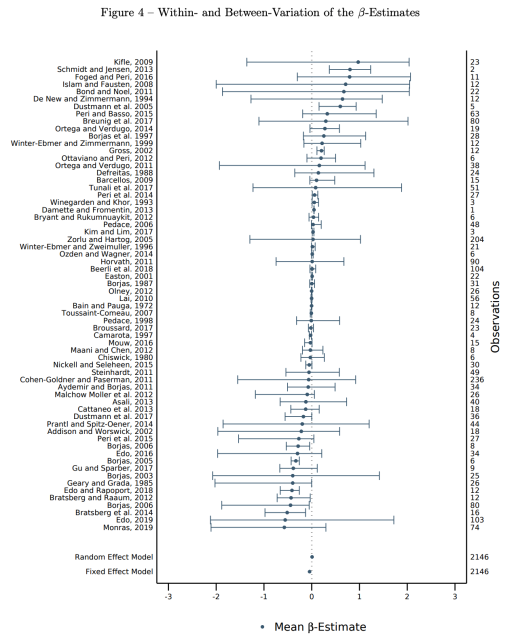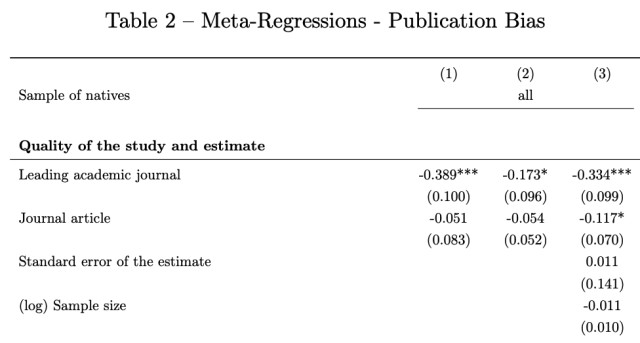Today I begin a 🧵 on new, striking immigration research.
First, in a long thread:
Léa Marchal et al. meta-analyze 2,146 estimated effects of immigration on native wages. Average almost exactly zero, across skill levels.
Novel result: publication bias favors negative estimates.
This entry was edited (2 years ago)



Michael Clemens
in reply to Michael Clemens • • •The US earnings gap between third-generation Mexican-American men and non-Mexican whites is about half as large today as in 1940.
Prior estimates, lacking full-count census data, have missed this progress by missing the best-integrated Mexican Americans.
Kosack+Ward—> doi.org/10.1017/S0022050720000…
El Sueño Americano? The Generational Progress of Mexican Americans Prior to World War II | The Journal of Economic History | Cambridge Core
Cambridge CoreMichael Clemens
in reply to Michael Clemens • • •Perceptions reign:
County-level unauthorized US immigration reduces native employment *in migrant-intensive sectors*, & shifts local expenditure from education to policing…
…but null effects on unemployment, wages, crime rates
Tiburcio+Camarena: ernestotiburcio.files.wordpres…
Michael Clemens
in reply to Michael Clemens • • •Do ethnic enclaves prevent economic integration by new immigrants, or serve as a gateway to greater integration?
In Sweden 2000–2010, enclaves help—when residents are employed. Integration of earlier arrivals makes them an engine of new integration.
Kadarik et al.—> doi.org/10.1177/0308518X219897…
Michael Clemens
in reply to Michael Clemens • • •When people with xenophobic beliefs perceive those beliefs as widespread, they are more likely to express xenophobia…
…but also: People who *disagree* with those beliefs are less likely to sanction expressions of xenophobia
By Bursztyn+Egorov+Fiorin —> doi.org/10.1257/aer.20171175
Michael Clemens
in reply to Michael Clemens • • •Having forced migrants in your family *or* local community — generations ago — is correlated with pro-refugee attitudes and behaviors today, in Germany and Greece.
By Dinas, Fouka, & Schläpfer —> doi.org/10.1086/710016
Michael Clemens
in reply to Michael Clemens • • •Continuing 🧵 of new migration research:
In a novel randomized evaluation, standalone English-language training for adult immigrants in the US…
—Causes ↑ 56% in annual earnings (years 2–10)
—Has +6% ROI for public purse via ↑ tax revenue
By Heller+Slungaard Mumma—> doi.org/10.1257/pol.20210336 #LaborEcon
Michael Clemens
in reply to Michael Clemens • • •In fiscal 2023, the largest single nationality of migrant encountered at the US southwest border—apart from Mexicans—was Venezuelans.
Using Venezuelans' spatial settlement patterns, Gunadi tests and fails to detect impacts on native labor force outcomes, at any skill level—> doi.org/10.1111/obes.12455
Michael Clemens
in reply to Michael Clemens • • •Greater exposure to foreign-born classmates causes ↑ native math+reading test scores, greatest ↑ for black students
Uses *within household* variation, full universe K–12 data from Florida 2002–2012
Forthcoming in REStud by Figlio et al.—>
nber.org/papers/w28596 #immigration
Diversity in Schools: Immigrants and the Educational Performance of U.S. Born Students
NBERMichael Clemens
in reply to Michael Clemens • • •In the Netherlands, natives 8% less likely to cooperate with a non-Western immigrant, in second stage of a trust game, if immigrant trusts the native
In other words, the returns to being trustworthy are lower for the immigrant
By Cettolin+Suetens in EJ—> doi.org/10.1111/ecoj.12629 #immigration
Michael Clemens
in reply to Michael Clemens • • •Immigration-driven increases in ethnic/occupational diversity—measured by surname diversity in full-universe census—caused ↑ innovation in US counties, 1850–1940
Not compositional: robust to surname FE
Simply meeting more people unlike oneself causes more new economic ideas measured as patents, including 'breakthrough' highly-cited patents
By my star GMU colleague Jonathan Schulz, +Posch & Henrich—>
dx.doi.org/10.2139/ssrn.453120… #LaborEcon #Immigration
Surname Diversity, Social Ties and Innovation
dx.doi.orgMichael Clemens
in reply to Michael Clemens • • •Does immigration cause reduced support for social policy?
73 research teams—using identical data—reached vastly different estimates.
"Researchers must make analytical decisions so minute that they often do not even register as decisions."
Breznau et al.—> doi.org/10.1073/pnas.220315011… #immigration #laborecon